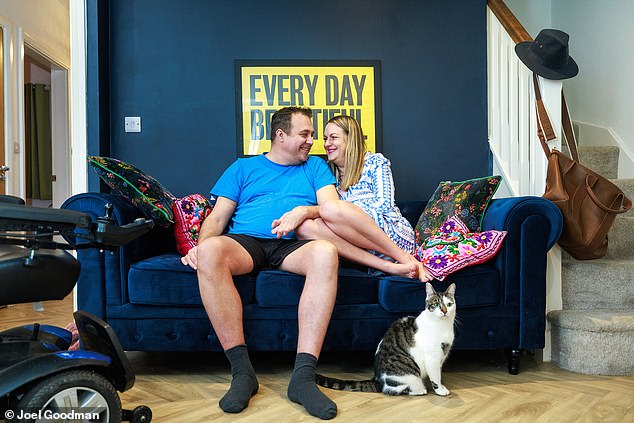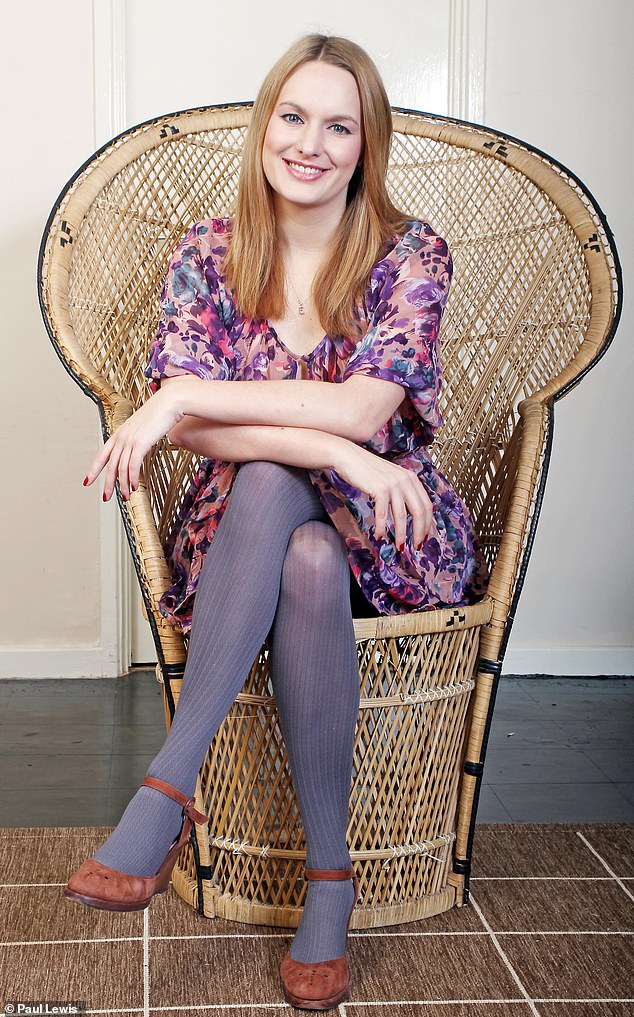I didn’t have an orgasm until I was 29, but since then I’ve learned how to have one with my partner EVERY TIME we make love… here’s how you can too
I was 29 years old when I had my first orgasm. I was, to put it mildly, alone at that moment. And it was a revelation.
It was like I had opened up a part of my life that had been locked tight, and now suddenly so many things fell into place.
I thought, this is probably why everyone makes such a big deal about sex.
Until that night, when I canceled my plans to lie in bed alone, I felt uncomfortable with the thought of touching my own body.
I had spent my teenage years and early 20s with a deep distaste for my appearance, which meant I was repulsed by my body and didn’t feel like I deserved to feel pleasure.
Author Erica Crompton now feels at one with her body, after spending her teens and twenties reticent about her sexuality.

Erica Crompton at home with her partner Paul, who has helped her feel comfortable in her own body.
I suffered from eating disorders for years that destroyed my life, including an addiction to laxatives, which took me even further away from my physical self.
I had some boyfriend troubles in my late teens, but I never really enjoyed them. My priority with romantic interests was always safety — someone who wouldn’t betray me or leave me — rather than a man I was attracted to.
It meant that I never really felt desire. Needless to say, I never climaxed.
But then, at 29, I broke up with a man I’d never had good sex with. I thought, enough was enough. I was going to have an orgasm — and I was going to do it myself.
I read everything there was to read about masturbation, sex and orgasms and spent an entire afternoon and evening on my body.
After some searching I discovered the places on my body that were particularly sensitive and where the pressure felt pleasant.
It took some trial and error, but eventually I had my first orgasm.
It felt liberating and I could hardly believe it had taken so long for me to experience such a powerful sensation.
The next few weeks I spent discovering my physical self and, for the first time in my life, giving myself permission to feel something good.

A recent survey of 24,000 American adults ages 18 to 100 found that women experience orgasm about half the time they have sex, while men say they reach orgasm 70-85 percent of the time.
And I’m proud of the fact that since then I come almost every time I have sex, although there is usually some foreplay involved.
I have been with my current partner for three years now and our intimacy has never left me feeling unsatisfied. I know this is not the case for most women.
The precious time I spent getting to know myself in my late 20s was an education in what works and what doesn’t. I know the right rhythms, positions, nerve endings and most importantly, I’m not afraid to ask for what I want.
I’m not the only one who suffers from delayed sexual arousal.
Polls show that around a fifth of women think masturbation is ‘shameful’ or ‘wrong’. Experts have suggested that this could have something to do with the prevailing culture that focuses more on male sexual pleasure than female.
“The sex we see in movies or porn is generally more focused on male excitement, fast thrusts and a race to the finish,” says sexologist Mangala Holland.
‘Female bodies tend to respond better to more foreplay and a longer build-up of arousal.’
But I think our inability to get to know our bodies is at the root of one of the greatest – and most unfortunate – gender gaps: the orgasm gap.
A recent survey of 24,000 American adults ages 18 to 100 found that women experience orgasm about half the time they have sex, while men say they reach orgasm 70-85 percent of the time.
This is often dismissed as biology. Some say that the difference in male and female anatomy means that many women simply cannot climax during intercourse, and there is little you can do about it.
But Holland says that by regularly exploring your body, including the entrance to the vaginal canal, you can learn subtle positions that can make the experience with a partner much more pleasurable.
For example, if your nerve endings are located in the back of your body, you can place a pillow under your lower back to lift your pelvis. This can help stimulate the areas you need.
In addition, self-knowledge makes you better able to ask your partner for specific, sensitive spots, for example with a hand or even a toy.
I’ve found that practicing this level of honesty in intimate moments creates healthy communication outside of the bedroom.
These types of conversations allow me to ask my partner for extra time or emotional support when I need it.
If you already feel ‘at one’ with yourself, but still have trouble experiencing dizzying pleasure during sex, don’t worry, there is nothing wrong with you.
Some medications and underlying health conditions can affect your libido and desensitize the nerves in your intimate area.
In retrospect, I think my reluctance to masturbate in my teens and twenties was the result of a difficult childhood where I felt worthless and not good enough.
And then, at the age of 22, I had a psychotic episode – which I wrote about earlier in The Mail.
It marked the beginning of a period of years of psychological problems, for which I have now received treatment.
This ordeal made me feel even more disconnected from my body. Sex was at the bottom of my priority list.
“Some women may experience orgasm block for psychological reasons, such as past emotional trauma or negative messages about sex from their family or religion,” says sexual health expert Dr. Michael Krychman.
‘While it is important to explore your sexual feelings on your own, it may also be necessary to consult a sexual health professional.’
Now, at 44, I can happily say that I am more comfortable with my body than ever before. Plus, I have 15 years of orgasms under my belt — and counting.
